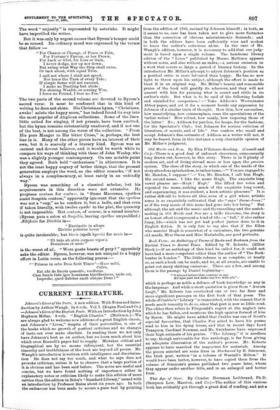CURRENT LITERATURE.
Johnson's Lives of the Poets. A. new edition. With Notes and Intro- duction by Arthur Waugh. In 6 vols. Vol. I. (Began Paul and Co.) —Johnson's Lives of the English Poets. With an Introduction by John Hepburn Millar. 3 vols. " English Classics." (Methuen.)—We are always glad to welcome new editions of a great English classic, and Johnson's "Lives," despite of their perversities, is one of the books which no growth of poetical criticism and no changes of taste can ever make obsolete. In reading them we not only have Johnson's best as an author, but we learn much about him which even Boswell's pages fail to supply. Mistakes critical and biographical are by no means infrequent, but the essential sincerity and truthfulness of the book are beyond all praise. Mr. Waugh's introduction is written with intelligence and discrimina- tion He does not say too much, and what he says does not provoke criticism, unless it be to observe that a large portion of it is obvious and has been said before. The notes are useful and concise, but we have found nothing of importance either in explanatory notes or criticism likely to make this edition of more service than the edition in Bohn's " Standard Library," issued with an introduction by Professor Hales about six years ago. In both the endeavour has been made to secure a pure text by printing from the edition of 1783, revised by Johnson himself ; in both, as it seems to us, care has been taken not to give more footnotes than the correction of obvious misstatements demands ; and in both the editors have been sufficiently wise and modest to leave the author's criticisms alone. In the case of Mr. Waugh's edition, however, it is necessary to add that our judg- ment is based upon a single volume. The handsome library edition of the " Lives" published by Messrs. Methuen appears without notes, and also without an index,—a serious omission in a work that covers so large a period of literary history. In the introduction Mr. Millar's attempt to adjust Johnson's position as a poetical critic is more laboured than happy. He has no new light to throw upon his subject, although the effort is made to treat it in an original way. Mr. Millar's hearty and reasonable praise of the book will gratify its admirers, and they will not quarrel with him for praising what is sound and virile in its author's style. But what is to be said of the following foolish and uncalled for comparison ?—" Take Addison's Westminster Abbey paper, and set it for a moment beside any expression by Johnson of a similar train of thought. How thin, how savourless, how unsatisfying, how commonplace, seem the speculations of the earlier writer ! How robust, how manly, how imposing those of the latter ! No ; Addison for patches, for hoops, for the fashions, for the Spectator's Club ; but Johnson for serious criticism of literature, of morals, and of life." Our readers who recall and accept Johnson's fine estimate of Addison as a writer will not, it may be feared, form in this instance a very charitable opinion of Mr. Millar's judgment.
















































 Previous page
Previous page